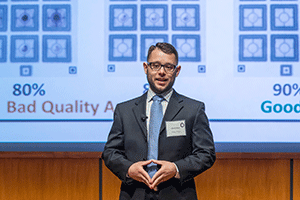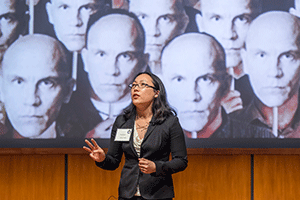
At the Three Minute Thesis competition (3MT) on Wednesday, March 16, nine graduate students at University of Notre Dame competed for prize money and a bid to the regional championships. Three graduate students from the College of Science competed. Nicholas Myers in the Department of Chemistry and Biochemistry won second place, and received $1,500, and Claire Bowen in the Department of Applied and Computational Mathematics and Statistics won the People’s Choice Award and received $1,000.
The 3MT competition challenges graduate students across all disciplines to explain their research in clear, succinct language to an audience of specialists and non-specialists alike in just three minutes. The student were allowed only one slide at the final competition which was held at the Jordan Auditorium at the Mendoza College of Business. Myers said, “As I prepared for the competition, I realized how difficult it is to create an effective graphic that a person can quickly interpret. I gave my slide to many people and asked them to tell me a story based only on the images they saw. I knew the graphic was perfect when person after person told me the same story that I was trying to convey.”
Myers quickly educated the crowd on the devastating problem of counterfeit and low-quality medicine in the developing world. According to the World Health Organization, 30 percent of pharmaceutical sold in the developing world are low quality. Testing drugs in low-resource areas is often not feasible. To address these problems, he and his colleagues developed paper test cards that can identify low-quality medicines without the need for a lab, and is currently working with computer scientists to develop a cell phone app that analyzes images of the test cards taken with a cell phone.
The paper test cards are portable, easy-to-use, and cost under $1 to make. The cards analyze penicillin-type antibiotics as well as the micronutrient iodine, which is necessary for proper mental and physical development of children. Thousands of test cards have been sent to agencies in Africa for validation studies. Myers said, “By texting images of the test cards to a central database, the quality of pharmaceuticals will be tracked across both geographical areas and time; this information will be shared with regulatory agencies and law enforcement, so they can investigate problematic samples.”

The competition achieved its goal of training and developing graduate students to be able to quickly reduce their dissertations to a three-minute oration while retaining the importance and impact of their work. “This competition gave me a chance to showcase skills that I have been refining for my entire graduate career,” Myers said. “I talk to a lot of non-chemists, so I have to sell my ideas in a way that is easy for them to digest. The most challenging aspect is avoiding over-generalizing my research while still using non-technical rhetoric. Having only three minutes to summarize my entire thesis, I made sure every spoken phrase had meaning and every visual display could be quickly understood. Conveying ideas succinctly is an important skill in any career.”
Originally published by at science.nd.edu on March 18, 2016.